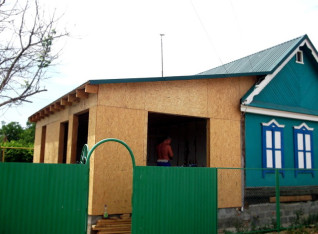Legalization of the house
The process of legalizing a house in Ukraine is an important and necessary procedure for those who have built a real estate object without the appropriate permits or in violation of building codes. Despite the fact that the construction of buildings without the necessary permits can lead to legal and financial consequences, it is possible to legalize and obtain all the necessary documents for an existing object. Legalizing a house includes several stages, starting from checking the compliance of construction works with the requirements of the law and ending with the execution of the necessary acts and registration with local authorities.
Since the procedure can be complex and requires knowledge of all the nuances of the law, it is recommended to contact specialists for professional legal assistance.
Legal stages of house legalization
The process includes several key stages, each of which has its own specifics and importance:
- Obtaining technical conditions: The owner must obtain technical conditions for connecting to utility networks (water supply, sewerage, electricity), if they have not been received previously.
- Passing the examination: Conducting a technical examination to determine the compliance of the structure with construction and safety standards. If necessary, perform work to eliminate identified deficiencies.
- Preparation of documents: Collection of all necessary documents, including technical specifications, certificates of completion of work, contracts for materials and services, building plans, etc.
- Applying to government authorities: Submitting an application to local authorities, usually the city/village council or administration, to legalize the building.
- Conducting an examination of the application: Authorities examine the submitted documents and monitor the compliance of the process with the law.
- Obtaining a permit to operate: Once the application is approved and all requirements are met, the owner receives a permit to operate the structure.
- Registration of ownership: After obtaining an operating permit, it is necessary to register the ownership of the structure in the appropriate government registry.
These are general steps that may vary depending on the region and specific circumstances. For a specific situation, it is recommended to contact qualified lawyers for detailed advice.
Under what conditions can a house legalization service be provided?
The provision of the service is possible only if several important criteria are met:
- Code compliance: The structure must comply with building codes and local building codes.
- Availability of necessary documents: The owner must provide all necessary documents, such as technical specifications, certificates of completed work, building plans, etc.
- Compliance with procedures: The owner must follow the legalization procedures required by law and local authorities.
The above conditions will help to avoid delays and legal problems.
Under what conditions can a house legalization service not be provided?

Non-compliance with the law: If the structure does not comply with the requirements of the law, for example, it was built without the necessary permit or a zoning violation.

Lack of necessary documents: If the owner has not provided all the necessary documents to legalize the structure.

Failure to Comply: If the owner has failed to comply with the requirements of the building or title process, such as correcting deficiencies or paying required fees.
How to legalize a house yourself?
It is possible to understand the process independently, but it requires following certain steps:
- Research the law: Familiarize yourself with the laws and regulations governing the construction and legalization of real estate in your country and region. This may include laws on land, construction, zoning, as well as local building codes.
- Checking the legal status: Determine the current legal status of your building. Check whether all necessary building permits have been obtained and whether there are any legal obstacles to legalization.
- Collection of documents: Collect all necessary documents, such as technical conditions for connecting to utility networks, building plans, certificates of completed work, etc.
- Contacting local authorities: Contact your local authorities or the department of architecture and urban planning for information on home legalization procedures and required documents.
- Compliance: Correct any identified deficiencies or violations that may prevent your building from being approved. This may include carrying out work to correct deficiencies or providing additional documents.
- Submitting an application: Submit an application for legalization of the house to the relevant authorities, providing all the necessary documents and information.
- Follow instructions and deadlines: Follow the instructions and recommendations provided by local authorities and ensure that you comply with all established deadlines and requirements.
- Obtaining a permit to operate: Once your application is approved, you will receive a permit to operate the structure.
Although independent legalization of a house is possible, for this you need to carefully follow all stages of the process, collect the necessary documents and consult with the authorities. However, if necessary, the help of a qualified lawyer will greatly simplify this process.
Frequently asked questions about house legalization
Question
How to legalize a country house?
Answer
Legalizing a home on a summer cottage involves a number of steps, which may vary depending on local rules and requirements. Here are the general steps that often need to be followed to legalize a country house: Checking the legal status of the dacha plot and house: Make sure that your dacha plot has the legal status and permission to build a residential property. Check the availability of the necessary building permits and the compliance of the country house with all legal requirements. Collection of necessary documents: Collect all documents that may be required to legalize a country house, including a certificate of ownership of the plot, building plans, certificates of work performed and others. Contacting local authorities: Contact your local department of architecture and urban planning or other competent authorities to find out about the procedures for legitimizing a holiday home and obtain the necessary information about the requirements and documents. Submitting an application for legalization of a house: Prepare and submit an application for legalization of a house on your summer cottage in accordance with the requirements of local authorities. You may need to fill out a special application form and attach copies of all required documents. Carrying out inspections and examinations: Your application will be reviewed and verified by the competent authorities. This may include checking the structure's compliance with building codes and regulations, as well as technical expertise. Correction of identified deficiencies: If any deficiencies or violations are identified during the inspection, they will need to be corrected. This may include carrying out additional work or providing additional documents. Obtaining permission to operate: After successful completion of the legalization process, you will receive permission to operate the house on your summer cottage. Considering that the process of legalizing a country house may vary depending on the region and specific rules, It is recommended that you contact local authorities or specialists for more detailed information and advice.
Question
How to legalize an already built house?
Answer
Legalizing an already built home can be a complex process, but it can be accomplished by following certain steps. Here are the general steps that usually need to be taken to legalize an already built house: Checking the Legality of the Construction: Evaluate the legality of the home's construction by ensuring that the structure was built in accordance with local codes and regulations, as well as required building permits. If there are any irregularities or shortcomings, you must be prepared to correct them. Preparation of necessary documents: Collect all documents on the issue of how to legalize a built house related to the construction of a house, such as building plans, certificates of completed work, building permits and other documents that may be required for legalization. Contacting local authorities: Contact your local architecture and urban planning department or other competent authorities to find out about the procedures for legalizing an already built house and obtain the necessary information about the requirements and documents. Submitting an application for legalization: Prepare and submit an application for legalization of the house in accordance with the requirements of local authorities. You may need to fill out a special application form and attach copies of all required documents. Carrying out inspections and examinations: Your application will be reviewed and verified by the competent authorities. This may include checking the structure's compliance with building codes and regulations, as well as technical expertise. Correction of identified deficiencies: If any deficiencies or violations are identified during the inspection, they will need to be corrected. This may include carrying out additional work or providing additional documents. Obtaining an Occupancy Permit: Upon successful completion of the legalization process, you will receive a permit to operate the home. Given that the legalization process may vary depending on the region and specific regulations, it is recommended that you contact your local authorities or specialists for more detailed information and advice.
Question
Legalize the house - price?
Answer
The cost of legalizing a home can vary significantly depending on several factors, including the location of the home, its size and type, the complexity of the legalization process, and the fees of the professionals who may be required to assist with the process. Below are the main factors that can influence the cost of legalizing a home: Region: Registration costs may vary depending on the location of the home. In some regions, legalization procedures may be more expensive due to differences in local laws or the cost of specialist services. Size and type of home: The complexity and cost of legalization may depend on the size and type of home. For example, legalizing a large country house may require more time and resources than legalizing a small building. Condition of the Home: If your home requires repairs or additional work to meet legal requirements, this can also affect the cost of legalization. Additional costs may arise due to the need for remedial work. Government Requirements and Fees: In some cases, local governments may charge certain fees for home title applications or other administrative procedures, which may also affect the overall cost of the service. Professional Services: If you seek help from lawyers, real estate consultants or other professionals, their fees may also affect the overall cost of the home title service. It is best to find out the exact cost of legalizing a home by contacting your local government or professionals, such as lawyers or real estate consultants, who have experience in this area and can make specific recommendations based on your situation.
What does the cost of a house legalization service depend on?
The price may depend on several factors. Firstly, the complexity of the process itself - if the building has serious violations or key documents are missing, the procedure may be longer and more complicated, which will affect the cost. Secondly, the geographical location of the real estate object - the cost may vary depending on the region, since in large cities or depending on local requirements the price of the service may be higher. The third factor is the qualification and experience of the lawyer, since more experienced specialists may charge higher fees for their services. It is also worth considering the need for additional procedures, such as engineering inspections or amendments to registration documents.
ConclusionRegulating a house is a multi-step process that requires compliance with legal requirements and local regulations. The process includes several key stages, starting from obtaining technical specifications and ending with registration of ownership. Independent legalization is possible, but requires attention to detail and compliance with all formalities. Therefore, the help of professionals can greatly facilitate this process, ensuring the correct execution of documents and compliance with all requirements.




































